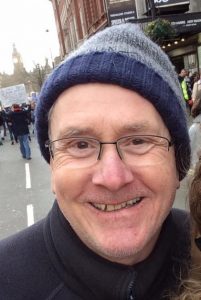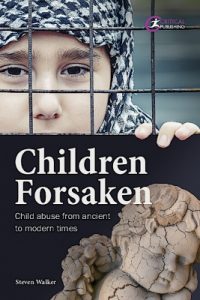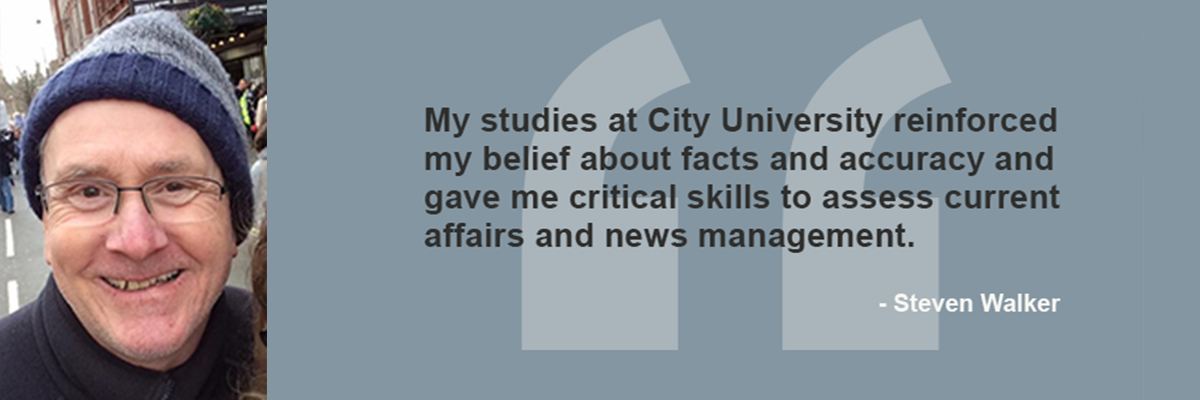Steven Walker (Journalism, 1981) worked as an Investigative Journalist in the 1980s with a special focus on social justice and anti-discriminatory practices. The contact he had with poor and vulnerable families at a difficult time encouraged him to change career and become a Social Worker. Steven recently published his 14th book “Children Forsaken”.
 “The book is a sober, factual account of the earliest recorded evidence of child abuse from the beginning of human civilisation through to the 21st Century,” Steven Walker, author of Children Forsaken – Child Abuse from Ancient to Modern Times (Critical Publishing, 2021) says.
“The book is a sober, factual account of the earliest recorded evidence of child abuse from the beginning of human civilisation through to the 21st Century,” Steven Walker, author of Children Forsaken – Child Abuse from Ancient to Modern Times (Critical Publishing, 2021) says.
“It contains practical, evidence-based advice about how to better support disadvantaged families and how to champion children’s rights. These two areas will help protect children in the future and reduce the prevalence of child abuse.”
According to Steven, the book was inspired by a documentary about an American Archaeologist who discovered a child’s remains in a 5,000-year-old Egyptian tomb.
“With new imaging and forensic techniques, the archaeologist realised that the child had been abused before death. So, I began my systematic research into the subject and discovered references to child sacrifice in early texts through to modern exposure of institutional child sexual abuse in churches, youth centres, sports organisations, etc.”
Steven started out as a Journalist in the 1980s, a period that was tough on many people, especially those who were already struggling.
“My journalism focused on investigative work with a particular emphasis on social justice and anti-discriminatory practice. In the 1980s, social and economic policies made life difficult for poor, vulnerable families in deprived areas, with a subsequent increase in adult mental illness and child abuse.”
For Steven, writing about these issues wasn’t enough, and he completed a master’s degree in Social Work at The London School of Economics and Political Science (LSE). As a Social Worker he was quickly confronted by the many challenges of helping families in hardship and keeping children safe.
“Working in child protection services is a very stressful job, so you need nerves of steel to keep going in the face of some terrible and distressing experiences. The challenges come from working under constant stress, lack of time and resources to support families at risk, fear of making a mistake or underestimating the dangers some children face. The triumphs or successes are thin on the ground but while removing a child from their family home is painful and disturbing for everyone involved, there is a sense of relief that for the time being the child is safe from harm.”
 After several years as a Senior Social Worker and a Lecturer, Steven now works independently. Still a Visiting Senior Lecturer at University of Essex, he also works as a Child Protection Consultant, Expert Witness, and has over the past 25 years authored 14 non-fiction books and 50 scientific research-based papers in international journals. According to Steven, these are aimed at students or practitioners in social work and other helping professions. He hopes his latest book, Children Forsaken, will continue to support the welfare of children and improve standards.
After several years as a Senior Social Worker and a Lecturer, Steven now works independently. Still a Visiting Senior Lecturer at University of Essex, he also works as a Child Protection Consultant, Expert Witness, and has over the past 25 years authored 14 non-fiction books and 50 scientific research-based papers in international journals. According to Steven, these are aimed at students or practitioners in social work and other helping professions. He hopes his latest book, Children Forsaken, will continue to support the welfare of children and improve standards.
“Those outside child protection services and academic researchers will find the book a revelation and hopefully be inspired to think more about how children can be better protected. The subject of children’s rights will appeal to those who feel that children are under-appreciated and their needs are not considered a priority in today’s world.”
Steven says he has happy memories from his time at City, and although he left the journalism profession some decades ago, he still finds that his journalism studies and subsequent work as a journalist, have supported him in his career in social work and academic writing.
“My biggest learnings, especially with regard to journalism, was a commitment to accuracy and factual information. This transferred to social work practice where factual evidence is required in child protection legal proceedings. I also developed empathy and understanding of why some people abuse, how their children feel, and learned how to manage stress and upsetting feelings”, Steven says.
He points out that an understanding of journalism, current affairs, and news management isn’t just for journalists.
“The news provides a window into our modern life and so anyone interested in current affairs and politics will benefit from journalism training.”
What additional advice does Steven have for anyone who would like to become a social worker?
“My advice to aspiring social workers is to do a lot of research into what is involved. It isn’t all child protection work but in these economic conditions with budget cuts, every aspect of modern social work carries an element of pressure and stress. If a person has experienced abuse themselves, they will be able to identify with a frightened, angry, and confused young person. Social work training requires students to know themselves so experience of counselling or therapy is very helpful. It is an immensely rewarding career where small successes can change people’s lives for the better. Social work is a non-judgemental occupation with a code of conduct which enshrines ethical, anti-discriminatory, socially inclusive, progressive concepts and is an appealing career for someone who wants to see change at the personal and societal level.”
Big thank you to Steven Walker for sharing his story! More information about his book Children Forsaken – Child Abuse from Ancient to Modern Times can be found here.
